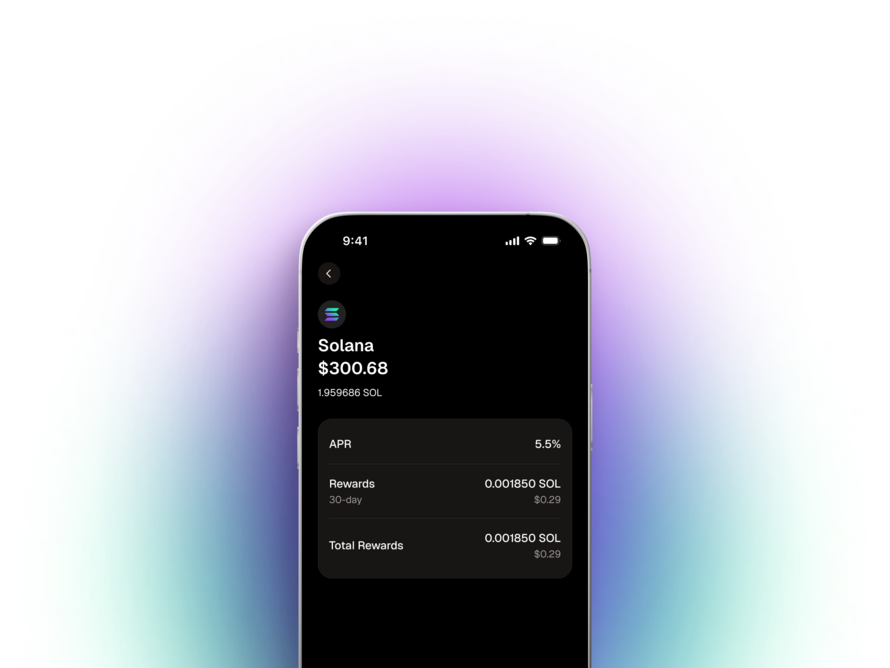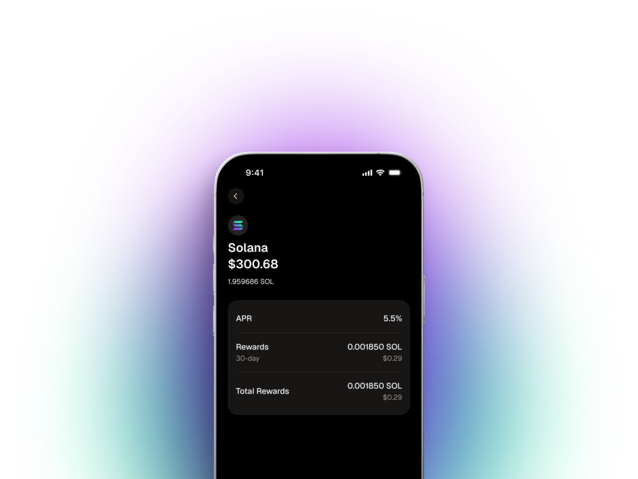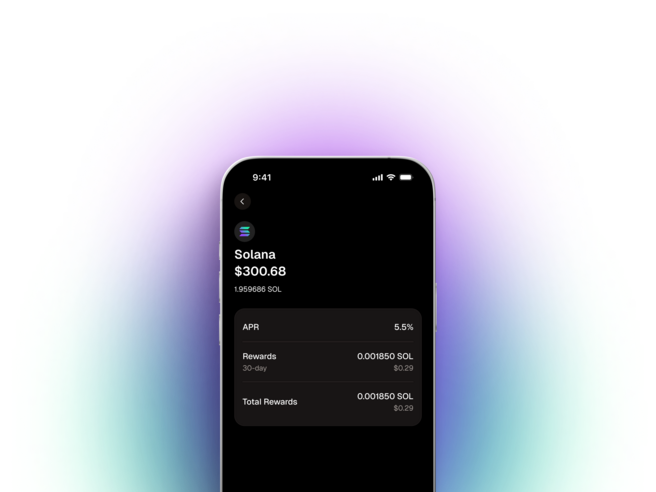Earn APR on your crypto
with Gemini Staking
Earn APR on
your crypto with Gemini Staking



1M+
Users Worldwide
24/7
Customer Support
100K+
Five Star Ratings
1M+
Users Worldwide
24/7
Customer Support
100K+
Five Star Ratings
Limited time offer
Get started on Gemini
with boosted yield
Get started on
Gemini with
boosted yieldCommission free staking for your first 3 months
Commission free staking for
your first 3 months
Assets available for
staking on Gemini
Assets available for
staking on Gemini
Customers can currently stake Ether (ETH) and Solana (SOL).
Reward rates may fluctuate based on network conditions.
Customers can currently stake Ether (ETH) and Solana (SOL). Reward rates may fluctuate based on network conditions.
Customers can currently stake Ether (ETH) and Solana (SOL). Reward rates may fluctuate based on network conditions.
Asset
APR

Solana
SOL
5.50%

Ether
ETH
2.41%
Institutions choose
Gemini for staking
No Minimums.
No Transfer Fees.
Start staking with any amount—there are no minimums, and no transfer or redemption fees. Gemini’s service fee is automatically deducted from the rewards you earn, so there are no surprise charges.
Start staking with any amount. There are no
transfer or redemption fees. Gemini’s fee is
automatically deducted from the rewards
you earn.
Crypto Staking 101

Why are Staking rewards not fixed?
Staking rewards are set by each protocol and fluctuate based on network conditions. These rewards typically depend on the fixed rate of new token issuance and how many participants are actively staking. When fewer validators and delegators are participating, rewards may be higher— and vice versa. Rewards are distributed proportionally to delegators based on their stake relative to the total network stake.

How do networks stay secure?
To protect the network, PoS chains penalize validators for malicious or negligent behavior through a process called slashing, which can reduce their staked assets. At Gemini, we only partner with trusted, top-tier validators—and if slashing ever occurs due to our infrastructure, you may be reimbursed. See the for details.

What is Proof of Stake?
Proof-of-stake (PoS) networks like Ethereum and Solana use staking to validate transactions and maintain network security. By staking your crypto, you're helping secure the blockchain— and in return, you can earn staking rewards.

How does Staking power validators?
Validators are selected to add new blocks to the blockchain based on the amount of tokens they've staked. When they successfully validate transactions, they earn rewards. These Gemini crypto rewards are then shared with users who delegate their tokens.
Staking methods
Staking

No minimum amount

Reward is shared proportionally
among participants

Cannot track position on-chain

Rewards are in a single address
Staking Pro

32 ETH for Ethereum staking

Owner of the validator receives the entire reward

Access to on-chain information including
validator and reward payments

Rewards are in a segregated address
Staking

No minimum amount

Reward is shared proportionally among participants

Cannot track position on-chain
Staking Pro

Minimum amount imposed by the network

Reward is not shared with anyone

Access to on-chain information including validator and reward payments
Why choose Gemini?
Why choose
Gemini?

Security-first infrastructure
Gemini is a New York Trust Company
regulated by the NYS Department of
Financial Services. We operate under
strict regulatory requirements and
high prudential standards.

Crypto security
Your assets are safeguarded in cold
storage and a small portion of assets
are held in our insured hot wallet.

Account protection
Multi-Factor Authentication (MFA) is
required for logins and withdrawals to keep
your account secure.

Security-first infrastructure
Gemini is a New York Trust Company regulated by the
NYS Department of Financial Services. We operate under strict capital requirements and cybersecurity standards, similar to traditional banks.

Crypto security
Your assets are safeguarded in cold storage. Only a small portion is held in our insured hot wallet.

Account protection
Multi-Factor Authentication (MFA) is required for
logins and withdrawals to keep
your account secure.

Security-first infrastructure
Gemini is a New York Trust Company regulated by the NYS Department of Financial Services. We operate under strict capital requirements and cybersecurity standards, similar to traditional banks.

Crypto security
Your assets are safeguarded in cold storage. Only a small portion is held in our insured hot wallet.

Account protection
Multi-Factor Authentication (MFA) is required for logins and withdrawals to keep your account secure.
Frequently asked questions
What is Staking?
Staking is an essential feature of proof of stake (PoS) protocols. Large PoS protocols including Polygon, Solana, and Polkadot allow users to stake their native tokens and earn rewards. Blockchain node operators must pledge their tokens, also known as staking, to a network in order to be selected as a block validator. As a reward for correctly adding valid blocks to the blockchain, node operators receive newly minted tokens and/or a portion of transaction fees (i.e., gas fees) as rewards, known as staking rewards. Node operators who perform invalid functions (eg. adding a corrupted block to the blockchain) could lose a portion of their pledged tokens, a function known as slashing. Our staking validators are highly effective, and have never been slashed.
There are various iterations of and a host of features that accompany them. For a deep dive into PoS, we invite you to .
What crypto can you stake on Gemini?
Customers can currently stake ether (ETH) and Solana (SOL).
What are the fees associated with Staking?
Gemini will distribute any earned rewards to you after receipt by Gemini, minus a Staking Services Fee of up to 30% of the rewards determined by the protocol. Some of the Staking Services Fee is used to pay ‘gas’ fees, third party fees, or infrastructure costs associated with staking and the remainder may be retained by Gemini.
Where do the Staking rewards come from?
Node operators pledge tokens to a network as a guarantee for correctly performing block validation operations. These node operators receive newly minted tokens and transaction fees as rewards for adding valid blocks to the network. Those newly minted tokens and transaction fees are the rewards for staking and will be passed onwards to those who have staked their tokens.
What is the difference between Staking and Staking Pro?
Staking Pro is a service designed for advanced customers who require more control over their staked assets and desire greater on-chain operational transparency.
This service is ideal for those who want to avoid sharing staking rewards and are willing to meet the network minimums. For Ethereum the minimum is 32 ETH. It's worth noting that it may take a significant amount of staked assets in Staking Pro to accrue high returns on Ethereum. This is because when a customer is using Staking Pro, they are running a personal validator to stake their ETH, rather than a pooled validator offered by Staking.
On the other hand, Basic Staking is an accessible option for customers who want to participate in staking without any minimum requirements. However, customers who choose Basic Staking will only receive rewards proportionally based on their stake amounts. Both options have their own advantages and disadvantages, so it's important for customers to carefully consider their needs and requirements before making a decision.
Why are the Staking rewards different for Staking and Staking Pro?
Staking Pro requires running a personal validator on the Ethereum network, which may result in lower staking rewards compared to someone who operates a larger number of validators. Fewer validators may mean a lower chance of being selected to propose new blocks and earn execution and MEV rewards.
This discrepancy in staking rewards can be attributed to the way Ethereum's proof-of-stake (PoS) consensus mechanism functions. In Ethereum's PoS system, the total staking rewards are distributed among all active validators in proportion to their stake.
With a limited number of active validators, running a personal validator means that your stake competes with all validators on the network for a share of the rewards. In contrast, someone operating a considerably larger number of validators has a greater combined stake, increasing their chances of being selected to validate blocks and earn rewards.
Therefore, while running personal validators on Ethereum provides an opportunity to participate in staking and earn rewards, it is important to acknowledge that the potential returns may be lower compared to those who operate a larger number of validators. It is advisable to consider these factors and evaluate the trade-offs when deciding on the number of validators to run on the Ethereum network.
Why are Staking rewards not fixed?
Staking rewards are a function of several supply and demand factors on the network, and the actual reward granted to staking participants is determined at the time rewards are granted. For example, because the number of newly minted tokens is usually a fixed amount in a specific timeframe, staking rewards are higher with fewer node operators and vice-versa.
Where is Staking available?
Gemini Staking is available in Argentina, Australia, Bahamas, Bermuda, Bhutan, Brazil, British Virgin Islands, Cayman Islands, Chile, Egypt, El Salvador, Guernsey, India, Israel, Jersey, Mexico, Panama, Peru, Puerto Rico, Saint Lucia, Saint Vincent and the Grenadines, South Africa, Switzerland, Turkey, U.S. Virgin Islands, certain jurisdictions in the United States, Uruguay, United Kingdom and Vietnam.
When can I get my staked assets back?
The unbonding period on ETH is variable and can be anywhere between 6 days to 60 days. The unbonding period on SOL is usually around 3 to 4 days.